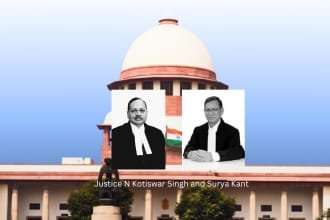In a significant development, the Supreme Court of India has summoned the Chief Secretary of Haryana to personally appear in court over the state’s failure to respond to a compensation claim made by the widow of a manual sewer cleaner who tragically lost his life while performing his duties. The case, filed under Article 32 of the Constitution, highlights the ongoing issues surrounding manual scavenging and the compensation due to the families of those who die while working in these hazardous conditions.
Background of the Case
The petitioner, a widow, sought compensation of Rs. 30 lakh from the Haryana government following the death of her husband. He passed away in 2022 after inhaling toxic gases while cleaning a sewer tank. This tragic incident reflects the dangerous and often overlooked nature of manual scavenging, which continues to affect countless workers in India despite legal provisions aimed at eradicating the practice.
The compensation claim is grounded in the Supreme Court’s 2023 judgment in the case of Balram Singh vs. Union of India & Ors, which laid down guidelines for compensating the families of those who lose their lives due to manual scavenging. The ruling specifically directed the state to ensure adequate compensation for the victims’ families and to take effective measures to prevent such incidents in the future. In light of this, the petitioner filed a claim for compensation, citing this precedent, but has yet to receive a response.
Haryana Government’s Inaction
Despite the Supreme Court’s directive on January 3, 2025, requiring the Haryana government to respond to the claim within four weeks, the petitioner’s representation, submitted on January 6, 2025, has not been acknowledged. The petitioners, who have approached the Supreme Court, claimed that their plea for compensation was ignored by the Haryana government, prompting the intervention of the court.
In response to the state’s disregard for its order, the Supreme Court bench, comprising Justices JB Pardiwala and R. Mahadevan, noted that Haryana had failed to comply with the court’s instructions, including ignoring the representation filed by the petitioner through her lawyer. As a result, the court summoned Haryana’s Chief Secretary to personally appear on May 9, 2025 to explain why the order had not been complied with.
Court’s Remarks and Consequences
The court’s dissatisfaction with the inaction of the Haryana government was evident as the bench questioned why the Chief Secretary had not considered the representation and failed to act in accordance with the court’s directive. The bench ordered the Chief Secretary to appear and clarify the reasons behind the delay. The court’s stern stance indicates the gravity with which it views the failure of government authorities to ensure justice for those affected by hazardous and unlawful labor practices such as manual scavenging.
The Broader Context of Manual Scavenging and Legal Protection
Manual scavenging, the practice of manually cleaning sewers and latrines, has been banned in India since the enactment of the Prohibition of Employment as Manual Scavengers and their Rehabilitation Act, 2013. Despite this, incidents of manual scavenging continue to be reported, often leading to fatal consequences for those involved. Many of these workers are employed informally, with limited to no social security benefits, making it difficult for their families to secure compensation in the event of death or injury.
The Supreme Court’s intervention in this case is part of a larger effort to address the systemic failure to protect manual scavengers and their families. In 2023, the Court had directed both the Union and State governments to provide adequate compensation to the families of victims and take active steps to eliminate manual scavenging.
Legal and Social Implications
This case not only highlights the ongoing issue of manual scavenging but also underscores the responsibility of state governments to uphold the rights of citizens, especially the marginalized. The petitioners’ case is rooted in a constitutional provision—Article 32—which grants individuals the right to approach the Supreme Court directly when their fundamental rights are violated. In this case, the right to life, as guaranteed under Article 21, was violated due to the unsafe working conditions that led to the manual sewer cleaner’s death.
Furthermore, the petitioners have invoked the Balram Singh case, which set a precedent for ensuring compensation for families affected by manual scavenging deaths. By summoning the Chief Secretary of Haryana, the court is sending a strong message to the state and other authorities to ensure that justice is not delayed and that vulnerable citizens receive their due entitlements.
Steps Forward
As the case progresses, the Supreme Court will likely continue to monitor the actions of state governments in addressing compensation claims for manual scavengers’ deaths. The government of Haryana, which has been summoned to explain its inaction, faces pressure to respond promptly and in a manner consistent with the Court’s orders.
Moreover, this case may trigger a broader discussion on the need for comprehensive reform in the policies addressing the welfare of manual scavengers and the enforcement of legal protections. Advocacy groups, human rights organizations, and legal experts have long pointed out the inadequacies in implementing existing laws against manual scavenging and ensuring adequate compensation for victims’ families.
Conclusion
The Supreme Court’s intervention in the case of the manual sewer cleaner’s death is an important step toward holding the Haryana government accountable for its failure to comply with legal obligations. By summoning the Chief Secretary to court, the judiciary is asserting its authority and demanding transparency and responsibility from state authorities in addressing the tragic and preventable deaths of manual scavengers. The case serves as a reminder that while legal frameworks may exist to protect vulnerable workers, their enforcement remains a critical challenge that requires constant vigilance and action from both the state and the judiciary.


